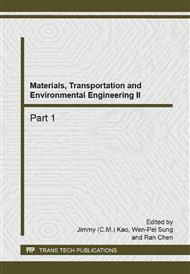[1]
Becker J. The Phrasal Lexicon [M ]. Cambridge Mass: Bolt and Newman, (1975).
Google Scholar
[2]
Altenberg B & Granger S. The grammatical and lexical patterning of make, in native and non 2 native student writing [ J ]. A pplied L inguistics, 2001, 22 (2) : 173 - 194.
DOI: 10.1093/applin/22.2.173
Google Scholar
[3]
Altenberg, B., 1998. On the phraseology of spoken English: The evidence of recurrent word-combinations. In A. Cowie( Ed. ), Phraseology: Theory, Analysis and Applications 101-122. Oxford: Oxford University Press.
Google Scholar
[4]
Pawley, A., & Syder, F. H. Two puzzles for linguistic theory: Nativelike selection and nativelike fluency. [C] in J. Richards, R Schimit. Language and Communication. London: Longman, 1983: 191-266.
Google Scholar
[5]
Nattinger J R & DeCarrico J S. Lexical Phrases and Language Teaching [M ]. Oxford: Oxford University Press, (1992).
DOI: 10.7202/001902ar
Google Scholar
[6]
Wray A. Form ulaic Language and the Lexicon [M ]. Cambridge: Cambridge University Press, (2002).
Google Scholar
[7]
Biber, D., S. Johansson, G. Leech, S. Conrad & E. Finegan (1999). The Longman grammar of spoken and written English. London: Longman.
DOI: 10.1017/s0022226702211627
Google Scholar
[8]
Lindstromberg, S., and Boers, F., 2008. The mnemonic effect of noticing alliteration in lexical chunks. Applied Linguistics 29: 200–222.
DOI: 10.1093/applin/amn007
Google Scholar
[9]
Lewis, M. The Lexical Approach [M]. Hove, England: Language Teaching Publications, (1993).
Google Scholar
[10]
Miller G A & Selfridge J A. Verbal context and the recall of meaningful material [ J ]. American Journal of Psychology, 1950, (63).
DOI: 10.2307/1418920
Google Scholar
[11]
Journal of Historical Pragmatics (2): 313-335.
Google Scholar


